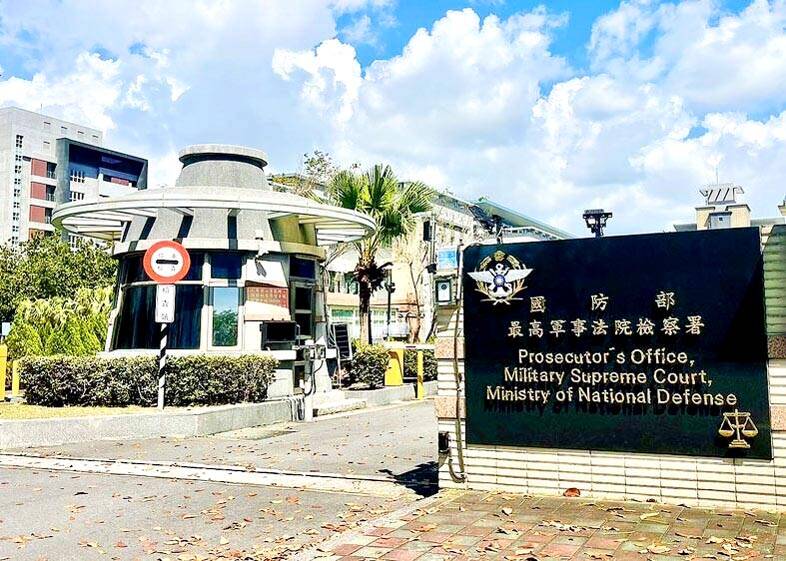Taiwan should set up a military court system based on the US version to ensure an independent and impartial military justice body, defense experts said.
President William Lai (賴清德) on Thursday last week said the government would seek to reinstate the military trial system to handle military related criminal cases involving active-duty troops amid increasing Chinese attempts to infiltrate the military.
The aim is to better address cases involving active-duty military officers accused of subversion, espionage, dereliction of duty and insubordination among other crimes, Lai said.

Photo: CNA
Lai’s plan would require legislative approval, as Taiwan abolished the military court system in 2013 following the death of army corporal Hung Chung-chiu (洪仲丘).
While there are still military judges, the law mandates that courts martial can take place only during times of war.
Democratic Progressive Party Legislator Chen Kuan-ting (陳冠廷), a member of the legislature’s Foreign Affairs and National Defense Committee, at the weekend said that the US had in the 1950s established an independent military court system for trials of active-duty troops accused of criminal offenses, regardless of wartime or peace, while Taiwan’s military judges in the past were directed by the nation’s armed forces and seen as lacking independence.
US military courts have broad authority, from minor offenses by enlisted personnel, to serious crimes of disobeying orders and desertion, Chen said.
A military court system should handle breaches of the Criminal Code of the Armed Forces (陸海空軍刑法) articles on treason, leaking state secrets and other national security offenses, he said.
Trials of troops charged with minor offenses, such as drunk driving causing injury or damage, should still be held in civilian courts, Chen said.
US military judges are professional Judge Advocate Generals (JAGs) and have to pass a bar exam, then undergo rigorous training in military jurisprudence, he said.
JAGs wear military uniforms, and have their own independent system of evaluation and promotion, while civilian and military leaders are prohibited from having “unlawful command influence” over JAGs, he added.
In comparison, before the reform in 2013, Taiwan did not have rigid training requirement for military court counsels and judges, mainly taking graduates from law school-related academic programs, so they had insufficient professional training, Chen said.
Taiwan can improve this by implementing the US system, he said.
The US system is governed by the Uniform Code of Military Justice, and separate branches of the armed forces and the US Coast Guard each have their own military courts, of which there are three levels — summary court, special court and general court, said Su Tzu-yun (蘇紫雲), research fellow at the Institute for National Defense and Security Research.
As such, the US military court system has more precision in handling disciplinary infractions to more serious offenses, while it can deal with specific issues and work conditions pertaining to each branch of the armed forces, Su said.
Taiwan should also implement “unlawful command influence” to prevent political and other undue interference, he said.
Under such system, military court judges, legal counsel and prosecutors can proceed with investigations and trial procedures while protecting the rights of the accused and national security, while cases involving serious crimes can be assessed and transferred to civilian courts when required, Su said.
Additional reporting by CNA

Taiwan is to commence mass production of the Tien Kung (天弓, “Sky Bow”) III, IV and V missiles by the second quarter of this year if the legislature approves the government’s NT$1.25 trillion (US$39.78 billion) special defense budget, an official said yesterday. Commenting on condition of anonymity, a defense official with knowledge of the matter said that the advanced systems are expected to provide crucial capabilities against ballistic and cruise missiles for the proposed “T-Dome,” an advanced, multi-layered air defense network. The Tien Kung III is an air defense missile with a maximum interception altitude of 35km. The Tien Kung IV and V

The disruption of 941 flights in and out of Taiwan due to China’s large-scale military exercises was no accident, but rather the result of a “quasi-blockade” used to simulate creating the air and sea routes needed for an amphibious landing, a military expert said. The disruptions occurred on Tuesday and lasted about 10 hours as China conducted live-fire drills in the Taiwan Strait. The Civil Aviation Administration (CAA) said the exercises affected 857 international flights and 84 domestic flights, affecting more than 100,000 travelers. Su Tzu-yun (蘇紫雲), a research fellow at the government-sponsored Institute for National Defense and Security Research, said the air

A strong continental cold air mass is to bring pollutants to Taiwan from tomorrow, the Ministry of Environment said today, as it issued an “orange” air quality alert for most of the country. All of Taiwan except for Hualien and Taitung counties is to be under an “orange” air quality alert tomorrow, indicating air quality that is unhealthy for sensitive groups. In China, areas from Shandong to Shanghai have been enveloped in haze since Saturday, the ministry said in a news release. Yesterday, hourly concentrations of PM2.5 in these areas ranged from 65 to 160 micrograms per cubic meter (mg/m³), and pollutants were

Taiwan’s armed forces have established response protocols for a wide range of sudden contingencies, including the “Wan Chun Plan” to protect the head of state, the Ministry of Defense (MND) said today. After US President Donald Trump on Saturday launched a series of airstrikes in Venezuela and kidnapped Venezuelan President Nicolas Maduro, concerns have been raised as to whether China would launch a similar “decapitation strike” on Taiwan. The armed forces regularly coordinate with relevant agencies and practice drills to ensure preparedness for a wide range of scenarios, Vice Minister of National Defense Hsu Szu-chien (徐斯儉) told reporters before a